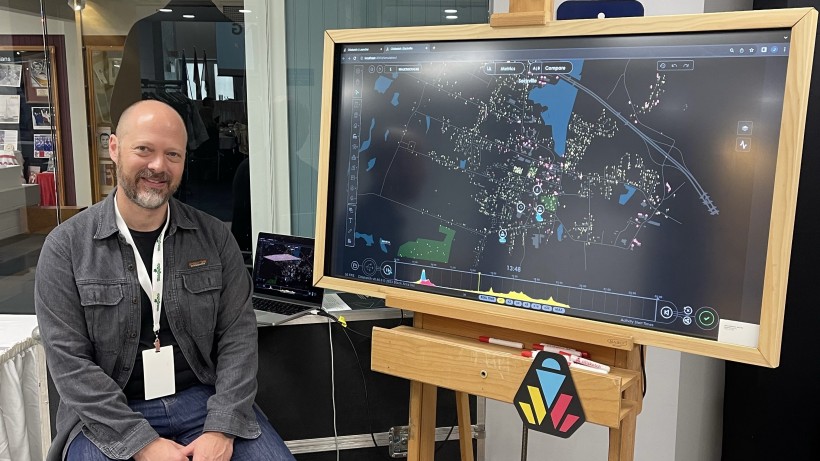While large language models and neural networks have been the forms of artificial intelligence dominating headlines this year, a Fredericton company has been busy deploying a system for modelling human behaviour using a very different type of AI.
The Black Arcs was founded by CEO Jake Arsenault in 2015 to help city planners and other policymakers predict human behaviour at scale, as well as its implications for issues like traffic flow. The company relies on a type of AI called agent-based modelling to simulate households based on demographic and census data.
The company is in the process of winding down a $1 million research and development deal with the Department of National Defence to adapt its technology to model disease outbreaks, originally announced last September. And Arsenault said in an interview he hopes to bag more defence deals in the future.
Because The Black Arcs’ software, Citisketch, does not have to model every single person in order to make reliable predictions, the platform is also readily scaleable and can be adapted to a range of different applications.
“It’s not one-to-one,” said Arsenault. “We’ll make plausible households that are representative of the census data and available data for that community. And then we’re modelling, what is the impact of changes to the built environment?
“What is the social equity of infrastructure designs? Will children be able to get to after-school programs based on different household profiles, based on school placement? … How will the placement of apartment buildings under construction now affect transit construction in future?”
Crucially for many use cases, Citisketch’s ability to operate based on relatively thin data means it can be used in rural communities — including for predicting how urban and rural areas might interact in relation to issues such as road networks.
Users interact with the platform via a web application that resembles a city-building video game like The Sims, with the aim of being accessible to people without deep technical knowledge.
Unusually for a startup, The Black Arcs is largely financed through operating revenue using what Arsenault described as a “project-based model.” That is, the company has spent the last several years working on a succession of projects for different clients, advancing its core technology along the way.
“No project has ever been the same to date,” Arsenault said. “We’re doing projects that take us down the roadmap for this broad use technology, and also going deeper with some key clients.”
Arsenault hopes the Department of Defence will become a repeat backer, but in the meantime, The Black Arcs’ next project is a smart city in Georgia called Peachtree Corners. That deal, he added, is the result of several years of business development work in the United States and is intended to be the company’s entry-point into the broader American smart city market.
The Black Arcs’ has a core team of four people, counting Arsenault, and staffs up on a per-project basis. At the height of the Department of Defence deal the team numbered 15 or 16 people. And if that project produces a follow-on agreement, as he said appears likely, the team could grow to as many as 30 people.
So far, The Black Arcs has done little in the way of capital raising. Arsenault describes its highly technical product offering and cross-sector use cases as a difficult pitch for venture capitalists, who often prefer companies solving a single, identifiable pain point. That could change for the right investor, he added, though the project-based funding model has so far proven to be an appealingly low-risk method of financing its operations.
“We don’t speculate,” he said. “We’ve always had a sponsor for every feature, for every step along the way."










